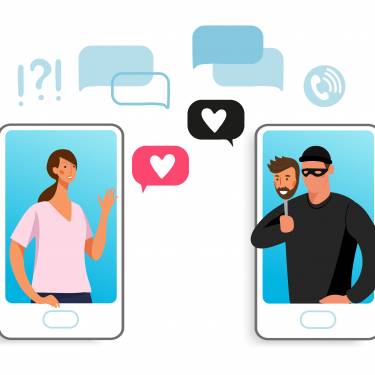Is It Too Good to Be True? Beware of the Romance Scam

Nothing tugs on the heart strings more than a good romance—whether it be in a novel, on a movie screen or in our own lives—but believe it or not that may leave us susceptible to online scammers.
‘Romance Scams’ (also referred to as ‘Love Scams’) use our very real emotions against us, with scammers building a romantic relationship with victims, gaining their trust so that the victim doesn’t hesitate to send money or other valuables to the scammer under the pretense of an emotional connection. The Federal Trade Commission reported that in 2022 almost 70,000 people were victims of this scam with losses totaling approximately $1.3 billion, averaged out to about $4,400 per person.

What Romance Scams Can Look Like
You match with someone on a dating app or social media, chat for some time, and then suddenly there’s an emergency or some situation where they can’t access their money. They ask you to help them by sending funds.
It’s more than just asking you for money. Scammers want you to use a method where it’s hard to trace who they really are, making it especially difficult for you to recover your losses. Examples could be:
- Purchasing gift cards
- Wires or instant transfers (Zelle, Venmo, CashApp)
- Cryptocurrency

Other Red Flags
Aside from asking for money, there may be other red flags to watch out for. Experts warn to be careful if you’re talking to someone online who:
- Is always out of the country for reasons like work
- Is never available to talk on the phone or over video chat
- Professes their love for you too quickly
- Asks for personal information or images that could be used as blackmail
If You Get Scammed
It can be hard to admit when you’ve been scammed, and we understand that it may be embarrassing. Something like this could happen to anyone—whether a romance scam or another type of con job.
After you realize you’ve been victim of a scam, it’s very important to report it to the proper authorities and your financial institutions. Even if they can’t recover your losses or pin down exactly who pulled this off, reporting these scams can help authorities understand how these scammers are executing their plans, where they’re doing it, and other information that could help them fight off these attacks in the future.
When you realize you’ve been involved in a scam, take these next steps:
- Contact your banks and financial institutions where money has been sent from or where account information might have been given out
- Report the person and situation to the online platform(s) where you met the scammer, communicated with them, or sent funds
- Report the fraud to the Federal Trade Commission at ReportFraud.ftc.gov
- File a complaint through your States’ Attorney’s Office
Metro members are urged to reach out to us immediately once they’ve realized they’ve been scammed so we can help you through what’s next.




